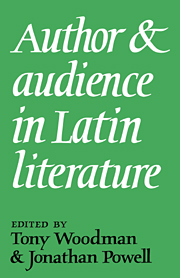Book contents
- Frontmatter
- Contents
- List of contributors
- Prologue
- 1 THE ORATOR AND THE READER: Manipulation and response in Cicero's Fifth Verrine
- 2 STRATAGEMS OF VANITY: Cicero, Ad familiares 5.12 and Pliny's letters
- 3 ‘SHALL I COMPARE THEE…?’: Catullus 68B and the limits of analogy
- 4 ATOMS AND ELEPHANTS: Lucretius 2.522–40
- 5 IN MEMORIAM GALLI: Propertius 1.21
- 6 THE POWER OF IMPLICATION: Horace's invitation to Maecenas (Odes 1.20)
- 7 THE VOICE OF VIRGIL: The pageant of Rome in Aeneid 6
- 8 FROM ORPHEUS TO ASS'S EARS: Ovid, Metamorphoses 10.1–11.193
- 9 POET AND AUDIENCE IN SENECAN TRAGEDY: Phaedra 358–430
- 10 PERSIUS' FIRST SATIRE: A re-examination
- 11 NERO'S ALIEN CAPITAL: Tacitus as paradoxographer (Annals 15.36–7)
- 12 AMOR CLERICALIS
- 13 EPILOGUE
- Notes
- Abbreviations and bibliography
- Indexes
4 - ATOMS AND ELEPHANTS: Lucretius 2.522–40
Published online by Cambridge University Press: 13 March 2010
- Frontmatter
- Contents
- List of contributors
- Prologue
- 1 THE ORATOR AND THE READER: Manipulation and response in Cicero's Fifth Verrine
- 2 STRATAGEMS OF VANITY: Cicero, Ad familiares 5.12 and Pliny's letters
- 3 ‘SHALL I COMPARE THEE…?’: Catullus 68B and the limits of analogy
- 4 ATOMS AND ELEPHANTS: Lucretius 2.522–40
- 5 IN MEMORIAM GALLI: Propertius 1.21
- 6 THE POWER OF IMPLICATION: Horace's invitation to Maecenas (Odes 1.20)
- 7 THE VOICE OF VIRGIL: The pageant of Rome in Aeneid 6
- 8 FROM ORPHEUS TO ASS'S EARS: Ovid, Metamorphoses 10.1–11.193
- 9 POET AND AUDIENCE IN SENECAN TRAGEDY: Phaedra 358–430
- 10 PERSIUS' FIRST SATIRE: A re-examination
- 11 NERO'S ALIEN CAPITAL: Tacitus as paradoxographer (Annals 15.36–7)
- 12 AMOR CLERICALIS
- 13 EPILOGUE
- Notes
- Abbreviations and bibliography
- Indexes
Summary
To those who care both for poetry and for rational argument, the De rerum natura is indeed, as David West boldly declared, ‘the greatest poem in Latin’. His elegant and indispensable book The imagery and poetry of Lucretius, described by its author as ‘an attempt to challenge the vulgar error that the De Rerum Natura consists of oases of poetry in deserts of philosophy’ brilliantly demonstrates that
the philosophical subject-matter of this poem is not an impediment to the poetry, it is rather the stimulus for the impassioned observation and contentious contemplation of the material world which contribute so much to the poetic intensity of the work.
But vulgar error is persistent, as Lucretius knew better than anyone; quare etiam atque etiam dicendum est.
At 1.931–4 (= 4.6–9), with characteristic clarity, Lucretius defines the nature of his work. He has earned the Muses' crown, he says,
primum quod magnis doceo de rebus et artis
religionum animum nodis exsoluere pergo,
deinde quod obscura de re tarn lucida pango
carmina, musaeo contingens cuncta lepore.
The first reason is the importance of his subject, which frees the mind from the bonds of religion; the second is the illuminating effect of his poetry, which touches everything with the Muses' charm. And there's a reason for it, as he immediately explains in the great simile of the honeyed cup (1.935–50 = 4.10–25).
It is, of course, a multiple-correspondence simile: the doctors are Lucretius, the sick children are the public (uulgus), the honey is the poetry, the unpleasant medicine is the saving message of Epicurus.
- Type
- Chapter
- Information
- Author and Audience in Latin Literature , pp. 45 - 51Publisher: Cambridge University PressPrint publication year: 1992

